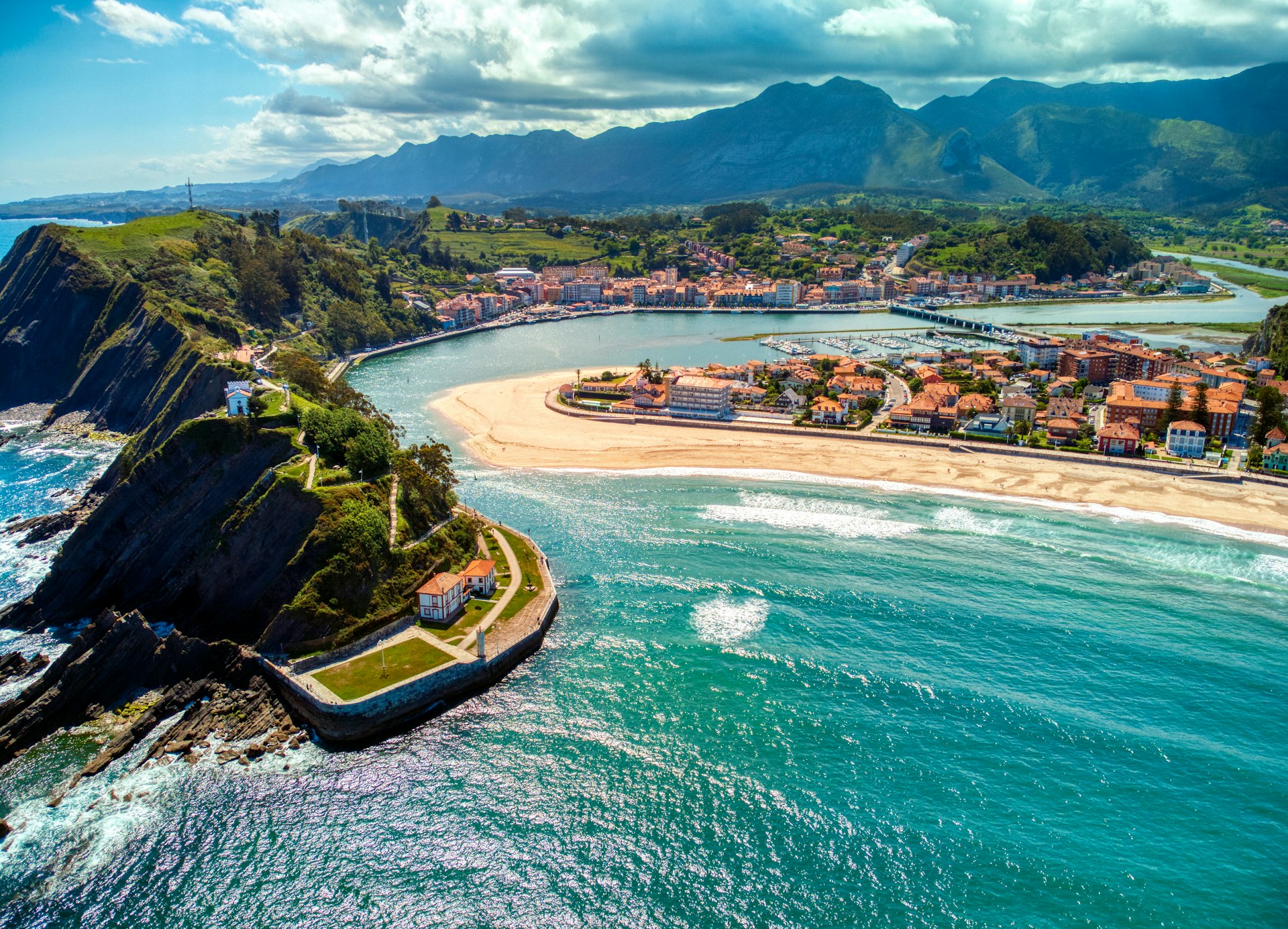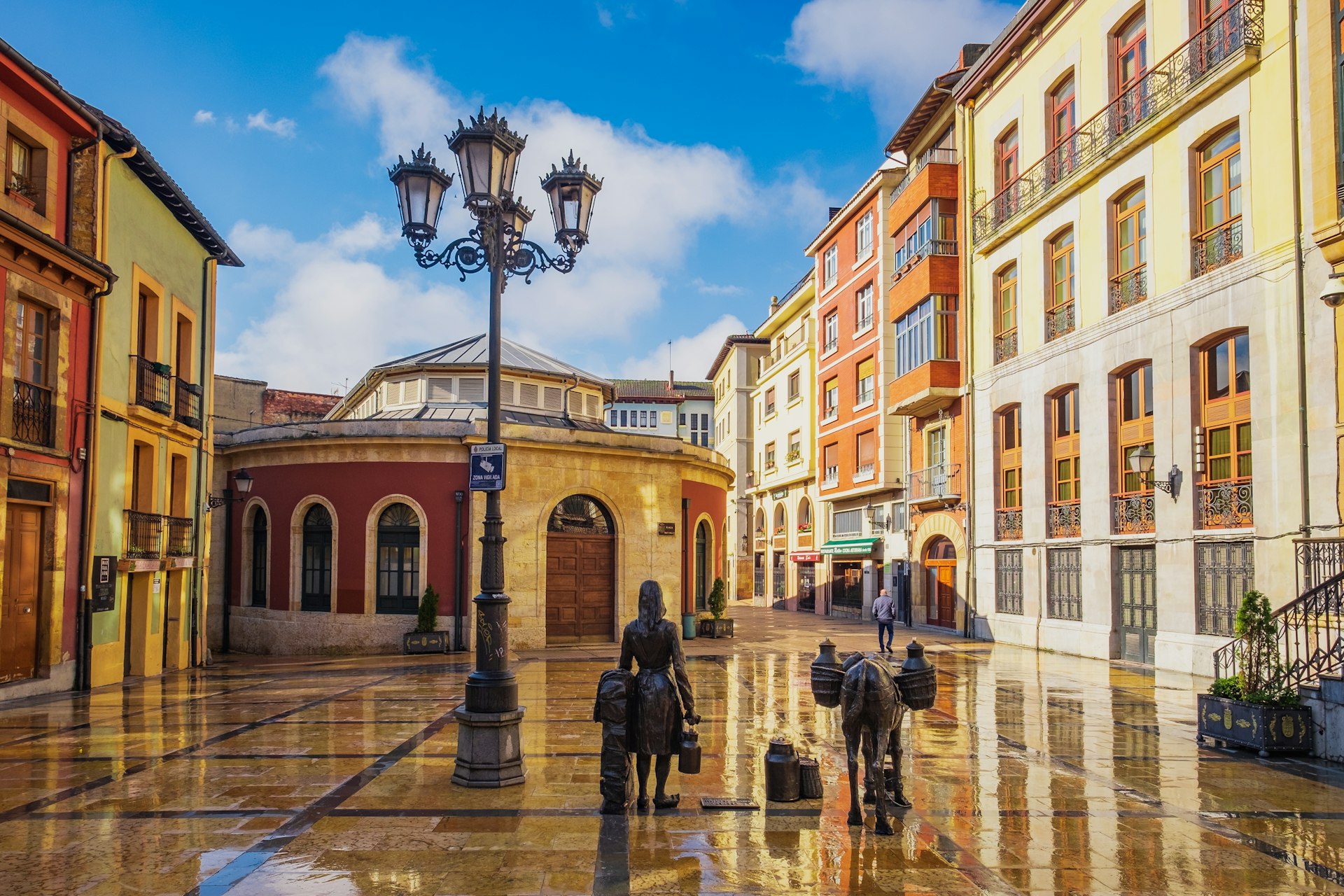In this series, Lonely Planet’s team of writers and editors answers your travel problems and provides tips and hacks to help you plan a hassle-free trip. The train in Spain? That’s one for Barcelona-based, Andalucía-raised travel expert Isabella Noble.
Question: I want to visit a city, an off-the-beaten-track destination and a beach in Spain by train, all in one trip. How can I do it?
Isabella Noble: With a raft of new routes launching, it’s a bumper year for train travel in Spain – and there’s never been a better time to explore the country by rail. Here are two itineraries, in two regions, that will let you see the best of this magical country by train.
A slow-paced northern journey
A lesser-known pocket of Spain with divine beaches? Head to the wonderfully green north coast. There’s a go-slow beauty to trundling through this region on the narrow-gauge FEVE railway, hopping off and on as you make your way east from Oviedo. Buy tickets at stations or on board; at the smallest stops you might have to flag trains down, bus-style.
Start with a couple of days in elegant Oviedo, capital of Asturias, whose charms include spectacular pre-Romanesque churches, lively markets, graceful plazas and the memorable Museo de Bellas Artes, along with a thriving food scene (think blue cheeses and crisp ciders). Tierra Astur on the famous Bulevar de la Sidra and Nacho Manzano’s Gloria are favorite local restaurants; consider a stay at the smart Barceló Oviedo Cervantes. Adding to the appeal is a brand-new high-speed AVE train line, expected to (finally) link Oviedo with Madrid later this year.
Next, hop on the FEVE to Arriondas (90 minutes), a peaceful little town in the foothills of the Asturian Picos de Europa mountains. It’s a great base for hiking, with serene rural bases such as Posada del Valle, a restored 19th-century home with its own organic farm.

Next, it’s beach time, via a 50-minute train to Ribadesella on Asturias’ cliff-edged coast. Set on an estuary, Ribadesella is known for its golden beach and wonderful seafood restaurants (try La Huertona). Come evening, sleep in a thoughtfully converted 20th-century palacete (mansion) at Villa Rosario. There’s a similar feel in nearby Llanes, a buzzing beach town 40 minutes further east. Plenty of gorgeous, remote beaches lie along this stretch of coast (I love Torimbia, Toranda and Gulpiyuri), and the Camino del Norte route of the Camino de Santiago passes through here, too.
From Ribadesella (90 minutes) or Llanes (40 minutes), take the FEVE east to San Vicente de la Barquera, Cantabria’s prettiest fishing town. The route stays close to the coast between Ribadesella and San Vicente, before turning inland to reach Cantabria’s capital Santander, home to sweeping beaches, the Renzo Piano–designed Centro Botín gallery and lovely boutique B&B Jardín Secreto.
South from Seville
For a taste of magical Andalucía, combine the soulful regional capital Seville with Cádiz Province’s wildly beautiful Costa de la Luz, with most of your travel on Renfe’s media distancia trains or cercanías (local commuter trains). You can prebook media distancia tickets; cercanías tickets are easily bought at the station on the day of your travel.

Three days is enough time to soak up Seville’s urban delights – the Moorish-origin Real Alcázar, flamenco-filled Triana, the magnificent cathedral – and the thrilling Andalucian tapas scene (La Brunilda, Eslava, Las Teresas). Hotel Casa 1800 Sevilla provides an evocative, central base in a reimagined 19th-century mansion. Time permitting, little-visited Carmona makes a wonderful side trip from Seville, with Roman, Moorish and Mudéjar relics; it’s easily reached by bus (75 minutes).
Heading south to Cádiz from Seville, don’t miss a night or two in lively Jerez de la Frontera, center of sherry and flamenco. It’s a one-hour train from Seville’s Santa Justa station to Jerez, where you can stay at stylish Hotel Bodega Tio Pepe, tour ancient bodegas like Lustau or Tradición and dive into the buzzy tabancos (sherry bars).
From Jerez, cercanías (45 minutes) and media distancia and Alvia trains (both 35 minutes) zip onwards to Cádiz, one of Europe’s oldest cities, with its buzzy historic center perched on a wind-lashed headland. Cádiz has a clutch of fabulous golden-white beaches, including Playa de la Caleta (bordering the old town’s Carnival-loving Barrio de La Viña) and surfy Playa de la Victoria, south of the centre. Savor the city’s famous tapas scene at Taberna La Sorpresa, Casa Manteca and the Mercado Central, and stay at Casa de las Cuatro Torres, an 18th-century mansion turned boutique hotel.

But the Cádiz region’s dreamiest beaches lie southeast of the city, along the blissfully undeveloped Costa de la Luz, which stretches all the way to Tarifa on the southern tip of mainland Europe. No trains run here, but it’s a scenic one-to-two-hour bus trip from Cádiz to the pretty Costa de la Luz hubs of Vejer, Conil and Tarifa – and the powdery white sands, wonderful gastronomy and kitesurfing vibe are the irresistible reward.
